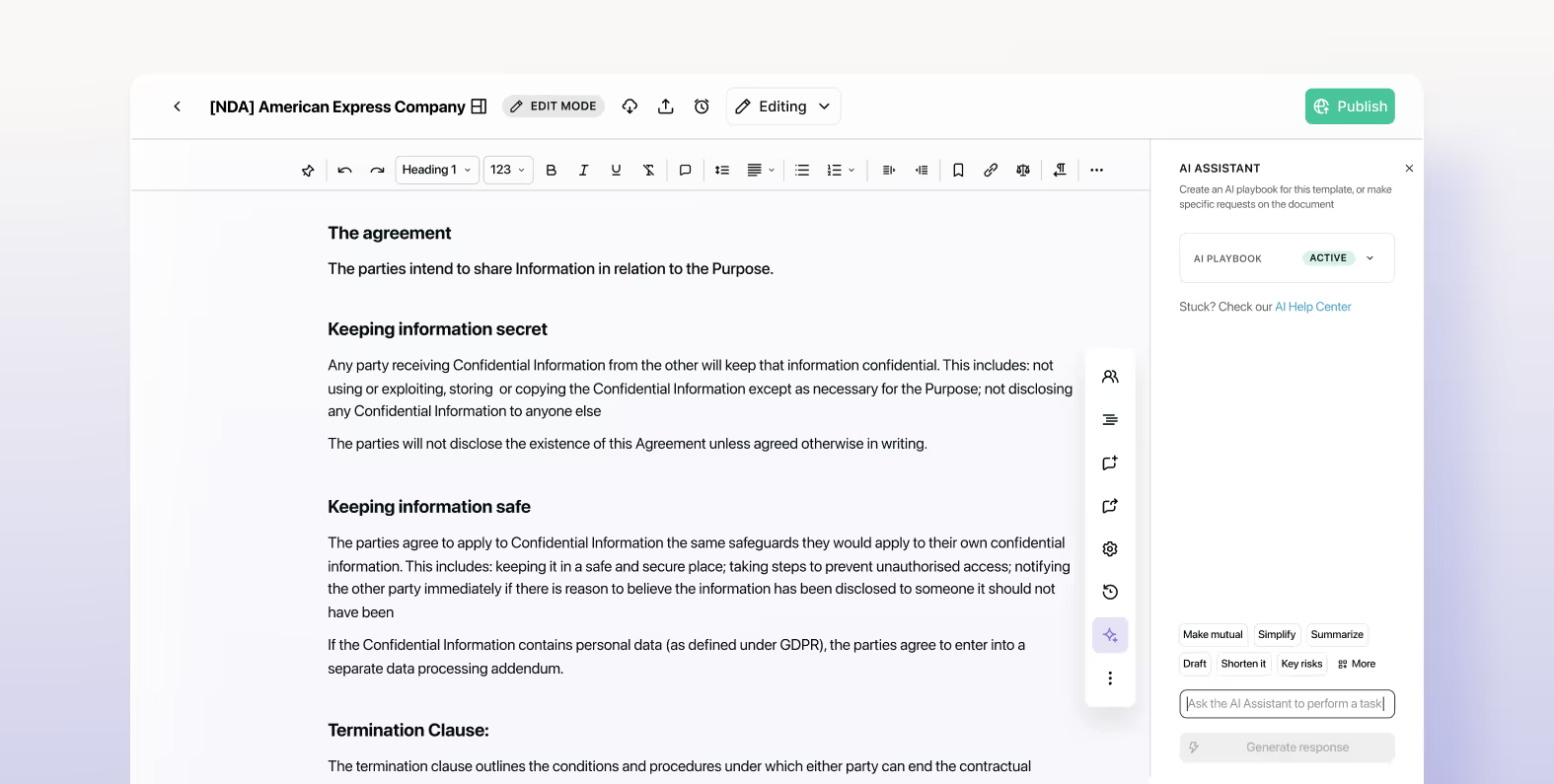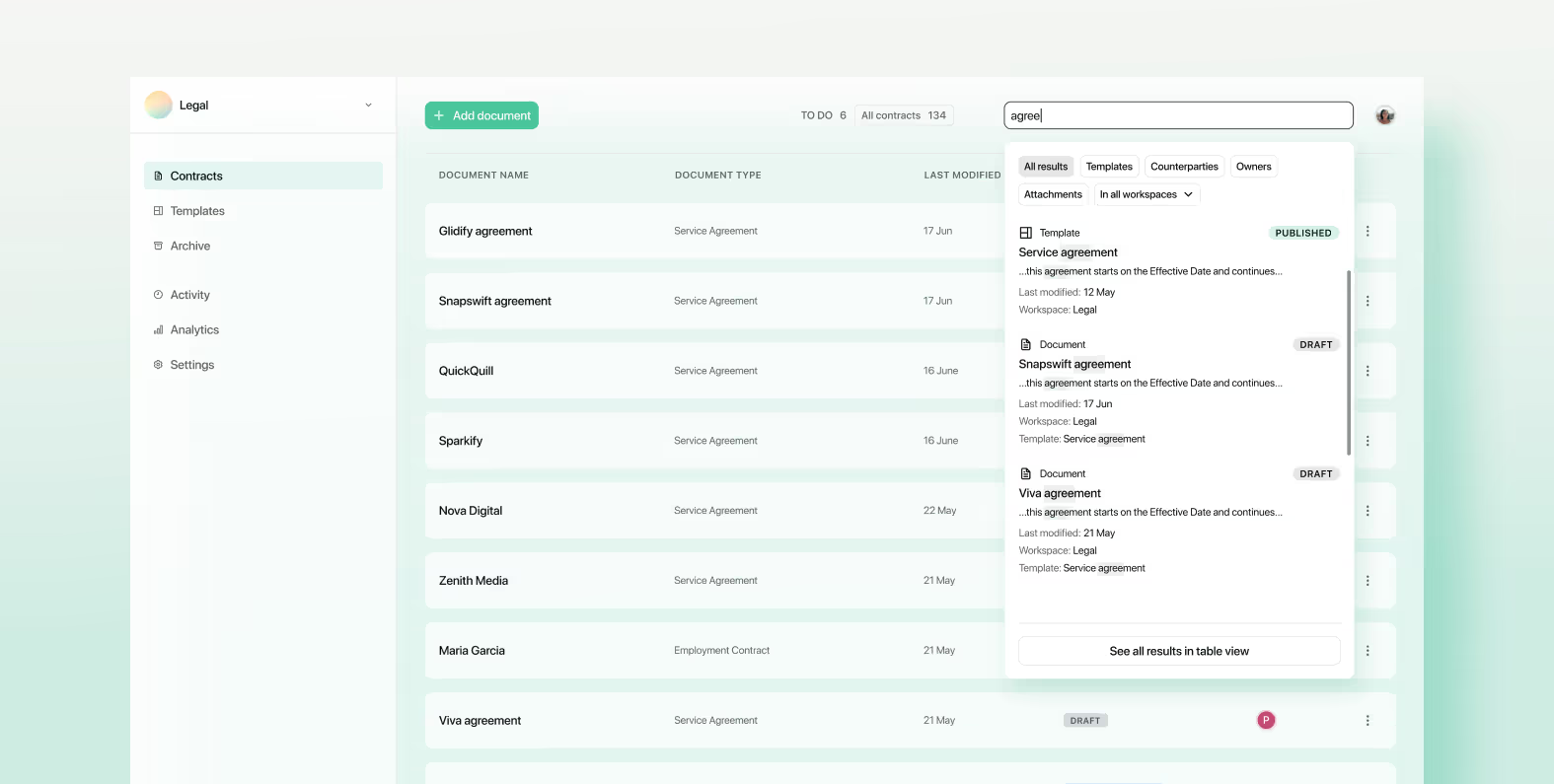Solutions
Customer Support
Resources
Set clear expectations with this SEO agreement template for agencies and clients to formalize deliverables, timelines, and performance metrics.




If done right, search engine optimization (SEO) practices remain an effective way to increase organic traffic and visibility for businesses in 2024 and beyond.
But as companies invest in SEO services, and align on their expectations, it is essential to have clear and robust agreements in place.
An SEO agreement is a legally binding contract between a business and a freelancer or agency that provides SEO (and other digital marketing) services.
An SEO contract outlines which digital marketing services will be provided, the pace at which the work will be delivered, and the fees charged for the deliverables agreed, among other things.
It outlines specific tasks like improving website content, building links to the site and other strategies to help the website rank higher in search engine results.
The most reliable SEO agreements will dig even deeper, outlining specific quality thresholds that need to be met by the deliverables.
The primary purpose of an SEO agreement is to set clear expectations and responsibilities for both the business requiring SEO services, and the service provider delivering these.
More specifically, an SEO agreement will help the parties by:
SEO agreements are typically managed by several stakeholders within a business. However, the scale of the project, contract value and team structure often determines who is most involved.

Let’s run through some examples of typical stakeholders:
An SEO service provider is usually responsible for drafting the agreement, outlining the services, setting expectations and delivering on the agreed tasks. This can be an SEO agency, independent contractor, or freelance SEO consultant.
The client or business hiring the service provider reviews, negotiates and eventually signs the agreement. Later down the line they're also responsible for providing any necessary information or resources to the SEO provider.
In larger organizations, a project manager or account manager might also get involved. the SEO agreement. They ensure that the terms of the agreement are followed to the letter and work to handle any issues that arise.
It's also wise for both parties to involve their legal teams during the review and drafting stage. They make sure the contract is fair, complies with legal standards and protects the interests of their respective parties.

"Different stakeholders add value at different points in the contract. Your finance and legal teams can negotiate more favourable terms around payment and renewals, for example. But it's your marketing team that will be able to spot service-related red flags best" - Sofia Tyson, Senior Content Manager
SEO agreements are used in various scenarios where a business seeks to improve its online visibility through search engine optimization services. Here are the key situations when SEO agreements are typically used:

A comprehensive SEO agreement template should cover the following elements in sufficient detail:
But it's also important to recognize which details you should exclude from the contract. A common mistake in SEO contracts is that they document and promise unrealistic and immeasurable expectations. This almost always lands the service provider in trouble, and the client is likely to lose trust.
"Your SEO agreement should be both clear and specific, but you should avoid over-promising results that are unpredictable, difficult to measure, and outside of your control"- Sofia Tyson, Senior Content Manager
In other cases, you'll want to explicitly rule out certain deliverables you know won't be offered as part of the service. This helps to avoid disappointment and align expectations early on.
"You should clearly define your responsibilities and specify what is not included in your scope of work. For instance, if your SEO services do not involve adjusting website code or making technical changes, make this explicit in writing" - Veruska Anconitano, Multilingual SEO expert, I am Veru
A standard SEO agreement template is initially created by the SEO account manager, consultant, or a member of the legal team. This template includes essential sections such as scope of services, objectives, payment terms, timelines, and other legal clauses.
Each agreement is then customized to fit the specific needs and circumstances of the client. This involves adjusting sections like the scope of services to outline specific SEO tasks (e.g. keyword research, on-page optimization, link building), defining clear objectives and goals, and setting specific payment terms (e.g. upfront fees, monthly payments).
This involves a series of steps, including redrafting outdated clauses and populating the relevant contract data into the template's fields.
Once the agreement is customized, it is then reviewed by internal stakeholders on both sides. This review involves checking for completeness, accuracy and alignment with the objectives and ways of working previously discussed by the parties.
Negotiation is common at this stage, too. The client will typically push back on fees, renewal terms, and other commercial teams that may create risk for their business.
"Price is one of the most commonly negotiated factors in an SEO agreement, along with other elements like contracted turnaround times, process restrictions, and what counts towards KPIs" - Oliver Sissons, Search Director, Reboot
This results in back-and-forth until adjustments to the agreement are made and the new terms are agreed. The negotiation process ensures that both the SEO provider and the client are satisfied with the agreement's terms before moving forward.
Once the terms are agreed upon, the agreement is signed by authorized representatives from both parties. Signatures can be obtained physically, through scanned signatures, or as eSignatures. This simply depends on the preferences of the parties involved and the tools available to them.
However, you choose to sign, this step formalizes the agreement and makes it legally binding.
Copies of the signed contract are then sent to all signatories and (hopefully) stored securely in a shared drive or contract repository of some sort.
The process described presents a several challenges for legal and business teams, particularly when SEO agencies and consultants work with lots of different clients and deliver a wide range of services:

Fortunately, you can address these challenges by improving your contract processes and adopting a reliable contract tool, like Juro. Let's explore these possibilities now.
Juro’s AI-native contract management platform addresses the challenges we just described by streamlining the creation, execution, and management of SEO agreements.
With Juro, teams can generate, review and approve contracts without constant legal intervention. This empowers non-legal teams to self-serve on standard contracts from their familiar tools, increasing overall productivity and allowing legal departments to focus on more complex matters.
Key features include:

Juro’s collaborative workspace facilitates real-time contract collaboration, enabling all parties to work together seamlessly. This reduces bottlenecks and accelerates the contract lifecycle – from drafting to execution – ensuring timely delivery of SEO services.
Key features include:

Juro provides a single, secure repository for all contracts, offering comprehensive visibility into contract statuses, deadlines and obligations. This centralized storage simplifies retrieval and auditing, so that no contract is ever lost or overlooked.
Key features include:

Juro's AI-native contract automation platform empowers all teams to create, agree, execute and manage contracts up to 10x faster than traditional tools. To find out more, hit the button below to book your personalized demo.
Hiring a freelancer? Running an event? Launching a campaign? These free-to-use contract templates help you put it in writing:
Juro is the #1-rated contract platform globally for speed of implementation.


Juro embeds contracting in the tools business teams use every day, so they can agree and manage contracts end-to-end - while legal stays in control.
Book your demo